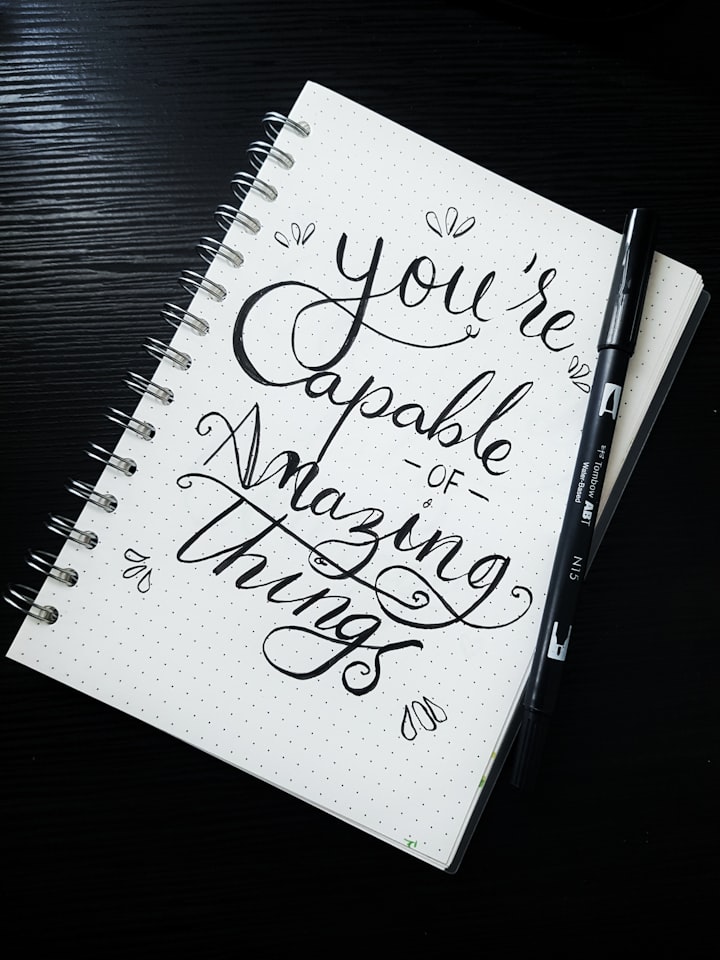Adventures in Book Writing
A Journey of Self-Discovery and Artistry
Have you ever found yourself so inspired to create something in a way you have never tried before? I've started a new venture recently... and by new I mean it is an unexplored and brand new project that I have been inspired to do. I have always been a book lover... novels, fairy tales, historical fiction, etc. I really enjoy diving into other worlds (looking at you Potterheads, Whovians and anyone who has ever fallen down a rabbit hole)! It's an idea I've had for a long time that I've built up in my head and now I'm making it happen.
Now in fullest discretion, I am starting this adventure for the first time. I do not know what works and I do not know if I will find success in the end. However, I find that working on new projects is always better with friends and if this is a journey you'd like to come on with me then please read on. Here are some things I have experienced in my first three weeks of book writing that I have found useful.
1. Be Inspired
This step is short and simple when put into words but it can be quite hard to put into action. If you aren't inspired, or you're already bored with your idea then you're going to hate writing it. Honestly, you won't even write it. Making time to write when you have a full-time life is hard, and it's impossible if you hate what you're writing about. Find something that excites you and just run with it.
2. Create a Safe Writing Space
Personally, I always need a safe place with the right energy to do any creative work. I like soft or natural lighting, candles, and comfortable seating. Starting from scratch you may not have a big office with a large mahogany desk and a comfy leather chair (props to you if you do) so work on finding a space with the right energy for you. You can start in your living room on the couch with an old-fashioned type writer, a lawn chair outside with a pen and paper, or at Starbucks with a laptop. Wherever your safe space is, make sure you go where you will be your most productive and most comfortable (just keep in mind that most publishers won't accept hand written or typed manuscripts--but it doesn't mean you can't start that way). My space is my couch in my sunlit living room with my notebook and my laptop. I keep tea or coffee going, an abundance of snacks near me so I don't have to keep getting up, and a large bottle of water.
3. Set a Daily Routine
This is a super helpful tactic for having maximum productivity. Treat writing as a job. No one is going to write for you and no one is going to make you write it yourself (unless you have a great relationship with someone who will make sure you write. Trust me, loving support helps). Even if you only write a page a day or a few pages a week make sure you don't stop writing. Goals are important. Have a set of long-term goals and short-term goals. The long term goals help you have a focus, and short term goals keep you away from getting overwhelmed. Keep weekly or daily goals that are just little things that you can check off so that you can feel yourself being productive. You don't want to feel like you're chipping away at an iceberg with a toothpick.
4. Read Between the Lines
The internet is full of free courses, paid courses, advice, scams, viruses and everything else under the sun. To be honest, it can be extremely useful and extremely overwhelming. You have to learn to read between the lines and to be patient so that you can find the best strategy for you. Research wisely and sparingly. During my first week of research I got so caught up in researching how to write that I didn't even get to writing. I call it Facebook Time. You scroll for five minutes, check the time and you've lost an hour and half without realizing it. Be careful of scams and getting sucked in to mountains of unnecessary information. Find a few things to try and figure out which strategies work best for you and your creative process. Most importantly, take the leap and get off of the internet.
5. Failure
Failure is the most important factor in any creative process. Do not be afraid or trial and error. We have to be willing to try strategies that will fail. You will write pages that you will completely delete. You may create an outline and throw it away, or fly by the seat of your pants and decide you need more structure. You'll never know what works best if you don't try multiple things and you'll never figure out a formula that will lead you to success.
Every author started somewhere...and so will you. Create that safe space and write whatever it is you want to write. Never stop reading and never stop writing. Do not let fear deter you from chasing a dream, because you'll never know what you're capable of when your sitting nice and cozy in your comfort zone. Go for it! Don't let yourself be your biggest obstacle.
About the Creator
Lynne Schabhetl
Lynne is a dancer working with Academy of Villains in Los Angeles. She has her B.A. in Dance and has a love for dance, choreography, musical theatre, singing, music, writing, reading, history, art, science, animals, and earth conservation.






Comments
There are no comments for this story
Be the first to respond and start the conversation.